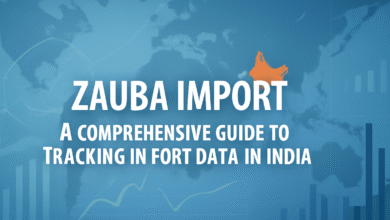Top 20 B2B Marketing Trends Reshaping Business Strategy

The Top 20 B2B marketing trends continue to redefine how companies connect with other businesses in a fast-evolving digital economy. As technology and buyer behavior shift rapidly, B2B marketers are adopting more strategic, data-driven, and human-centered approaches to capture attention and drive long-term engagement. Unlike B2C marketing, which often focuses on impulse and emotion, B2B marketing emphasizes trust, information, and long-term relationships. These trends not only influence how messages are delivered but also how value is created and sustained in competitive industries.
Account-Based Marketing for Personalized Outreach
Account-Based Marketing (ABM) has grown significantly as businesses seek more targeted engagement strategies. By focusing on key decision-makers within high-value accounts, ABM ensures personalized experiences that resonate more deeply with potential clients. Rather than broadcasting generalized messages, ABM uses refined data to tailor content that addresses the specific needs, pain points, and goals of select organizations. This approach boosts conversion rates and shortens the sales cycle, making it a valuable trend in modern B2B strategies.
AI and Automation Driving Marketing Efficiency
Artificial Intelligence (AI) and automation are revolutionizing how B2B marketers operate. AI-powered tools help analyze vast amounts of data quickly, providing insights that enable better decision-making. From email campaigns to lead scoring and customer service chatbots, automation reduces manual tasks and allows marketers to scale their efforts without sacrificing personalization. These technologies not only increase productivity but also enhance the ability to deliver relevant content at the right time.
Content Marketing Evolving into Thought Leadership
In the B2B space, content marketing has shifted from simply informing to building authority and trust. Businesses are investing in long-form, insightful content that positions them as thought leaders within their industry. This includes publishing whitepapers, in-depth blogs, webinars, and case studies that address complex topics with clarity and credibility. The goal is not just to attract traffic but to provide genuine value that influences purchasing decisions over time.
Video Marketing Becoming Central to Engagement
Video has become an essential tool for B2B communication, helping brands convey complex messages in an engaging format. Whether it’s explainer videos, virtual product demonstrations, or executive interviews, video allows businesses to humanize their offerings and connect more emotionally with potential clients. As platforms like YouTube, LinkedIn, and even email become more video-friendly, this format is playing a central role in B2B engagement strategies.
Data-Driven Decision Making in Campaigns
B2B marketers are relying heavily on analytics to refine their strategies. Campaigns are no longer driven by intuition alone; instead, every decision is backed by data. Marketers analyze user behavior, conversion metrics, and customer lifetime value to determine the effectiveness of their efforts. This data-centric mindset allows teams to allocate budgets more wisely, target audiences more effectively, and improve overall marketing ROI.
The Rise of Conversational Marketing
Conversational marketing is gaining momentum in B2B sectors, emphasizing real-time, one-on-one interactions with prospects. Chatbots, live chat tools, and AI assistants enable businesses to provide instant support and gather information efficiently. Unlike static forms and delayed emails, conversational tools offer a more natural, responsive experience that can accelerate lead qualification and nurture stronger client relationships.
Focus on Customer Experience and Retention
Customer experience is now as critical in B2B marketing as in B2C. Companies are realizing that a seamless, enjoyable buyer journey can significantly impact loyalty and repeat business. This involves personalized onboarding, responsive support, and value-driven communication throughout the relationship. As acquiring new customers becomes more expensive, retention strategies backed by excellent customer experience are a strategic priority.
Influencer Marketing Gaining Ground in B2B
While traditionally associated with B2C, influencer marketing is finding a place in B2B. Industry experts, analysts, and niche content creators are being leveraged to lend credibility to brands and amplify messages. These influencers help companies reach niche audiences more effectively, especially in complex fields where trust is a critical factor. The authenticity and reach of industry influencers can accelerate brand recognition and authority.
Integrated Marketing Across Channels
Omnichannel marketing has become essential in B2B, with brands ensuring consistent messaging across email, social media, webinars, websites, and events. Instead of relying on a single communication method, integrated strategies use multiple touchpoints to engage decision-makers where they are most active. Cohesion across these channels builds trust and reinforces brand messaging, making the buyer journey smoother and more effective.
Voice Search and SEO for B2B Discovery
With the rise of voice-enabled devices, B2B marketers are beginning to optimize content for voice search. Unlike traditional SEO, voice search often involves more conversational and long-tail keyword strategies. B2B buyers using voice commands to find services, products, or solutions expect concise and accurate answers. Marketers must ensure their content is optimized to appear in voice search results, especially for decision-makers seeking quick insights.
The Expansion of Social Selling
Social selling is no longer limited to B2C brands. B2B companies are leveraging platforms like LinkedIn to connect directly with prospects and build relationships through thoughtful content and personal interaction. Sales teams are trained to share valuable insights, comment on industry topics, and initiate conversations that nurture leads over time. This personalized approach on social platforms is proving effective for driving conversions and building brand trust.
Privacy and Data Regulations Influencing Strategy
With regulations like GDPR and CCPA, data privacy has become a central concern for B2B marketers. Compliance is not just a legal necessity but also a trust-building opportunity. Businesses are updating their data collection and storage practices, ensuring transparency and user consent in every interaction. These changes require marketers to be more intentional about how they gather and use data, often resulting in cleaner, more efficient campaigns.
Interactive Content to Drive Deeper Engagement
Interactive content such as quizzes, assessments, ROI calculators, and virtual demos is engaging B2B buyers in meaningful ways. Instead of passively consuming information, users participate in experiences that help them better understand a product’s value. This type of content also collects valuable behavioral data that can be used for further personalization. Interactive formats make learning about complex solutions more engaging and impactful.
Sustainability Messaging Resonating in B2B
Sustainability is becoming an important theme in B2B marketing as companies align with global environmental goals. Businesses are more vocal about their eco-friendly practices, ethical sourcing, and carbon reduction efforts. Sharing sustainability efforts through authentic storytelling helps attract partners who share similar values, building stronger, purpose-driven connections. As ESG factors become part of procurement decisions, sustainability is now a competitive differentiator.
Hybrid Events Replacing Traditional Trade Shows
The traditional trade show model is evolving into hybrid events that combine physical and digital experiences. B2B marketers now host virtual conferences, webinars, and livestreams that extend their reach beyond geographic limitations. These events offer flexible participation and often lead to better data collection and follow-up opportunities. The hybrid format also provides greater ROI and long-term engagement compared to one-time in-person shows.
Podcasting as a Thought Leadership Tool
Podcasts have emerged as a powerful platform for top 20 B2B Marketing Trends to demonstrate expertise and build loyal audiences. Executives and subject matter experts share insights, case studies, and market analysis in audio formats that are accessible and convenient. Podcasts help establish authority while reaching busy professionals during commutes or work breaks. Their growing popularity makes them a vital content strategy for businesses targeting industry-specific audiences.
Mobile Optimization as a Must-Have
B2B buyers are increasingly accessing information via mobile devices, making mobile optimization a non-negotiable element of any marketing strategy. Websites, emails, and landing pages must be designed for smooth navigation and fast loading on smartphones and tablets. With decision-makers conducting research on the go, mobile-friendly design directly impacts engagement and conversion rates.
Branding Becoming Central in B2B Strategy
Branding has taken center stage in top 20 B2B Marketing Trends as companies realize the power of emotional connections in business decisions. Strong brand identity helps companies differentiate themselves in crowded markets and fosters trust before sales conversations begin. Clear messaging, consistent visual identity, and purposeful values contribute to building a brand that clients remember and respect.
Sales and Marketing Alignment for Shared Goals
Successful top 20 B2B Marketing Trends now depend heavily on the alignment between marketing and sales teams. Collaboration on lead qualification, campaign planning, and customer feedback ensures both departments work toward shared objectives. When sales and marketing teams collaborate effectively, it results in higher-quality leads, more closed deals, and improved customer satisfaction.
Conclusion
The Top 20 B2B Marketing Trends technology landscape is expansive, but businesses are now focusing on refining and optimizing their martech stacks. Rather than adopting every new tool, companies are choosing integrated platforms that align closely with their specific goals. This reduces redundancy, improves performance, and ensures better data synchronization across departments. A streamlined martech stack contributes significantly to campaign effectiveness and ROI.
FAQS
What is the most impactful trend in B2B marketing today?
Account-Based Marketing (ABM) stands out for its personalized approach and high ROI in targeting key business accounts.
How important is video in B2B marketing?
Video is crucial for explaining complex ideas and engaging decision-makers across platforms like LinkedIn, YouTube, and webinars.
Why is content marketing shifting in B2B industries?
B2B content is evolving to focus on thought leadership, providing in-depth insights that build trust and guide purchasing decisions.
Are AI tools replacing B2B marketers?
No, AI tools enhance marketing by automating tasks and analyzing data, but human creativity and strategy remain essential.
What is the future of B2B events?
Hybrid events that blend in-person and digital elements are becoming the norm, offering flexibility and broader reach for participants.




